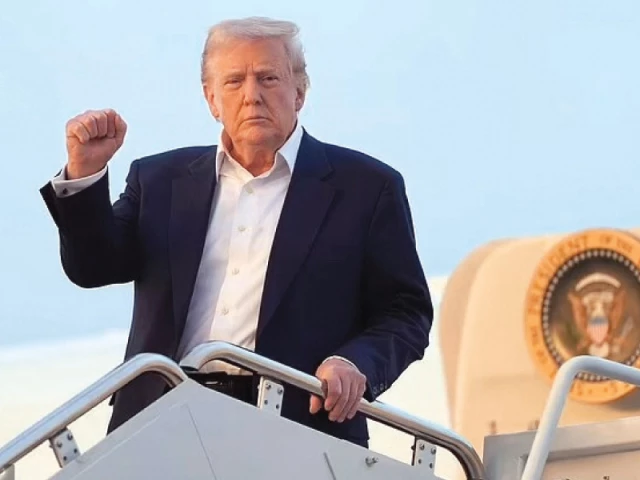Trump's tariffs hit foreign films
President considers non-US productions to be a 'national security threat'

One of Donald Trump's highlights during his opening few months in term number two will be forever engraving the word 'tariffs' to the public consciousness, and this time, Hollywood has entered the chat: on Sunday, the president announced that he would be imposing a 100 per cent tariff on all films produced outside the US.
A noble goal lies behind Trump's latest tariff bombshell: to protect national security. In his continued bid to Make America Great Again, Trump warned his followers on his social media platform Truth Socials that the American film industry is at risk of "dying a very fast death", and that films produced on foreign (i.e. non-American) soil are a "national security threat" and part of a "propaganda.
"The movie industry in America is dying a very fast death. Other countries are offering all sorts of incentives to draw our filmmakers and studios away from the United States," wrote Trump. "Hollywood, and many other areas within the USA, are being devastated. This is a concerted effort by other nations and, therefore, a national security threat. It is, in addition to everything else, messaging and propaganda!"
Viewing the film industry through this apocalyptic lens, nobody who has followed Trump's slew of global tariffs and trade war with China will be surprised to learn that his solution to what he views as an oncoming film industry extinction is yet more tariffs - a message the POTUS laid out in no uncertain terms in his post.
"I am authorising the Department of Commerce, and the United States Trade Representative, to immediately begin the process of instituting a 100 per cent tariff on any and all movies coming into our country that are produced in foreign lands," continued Trump.
Ending on a rousing finale, he concluded, in all caps, "We want movies made in America, again!"
The fallout
As per Variety, Trump's announcement sent shockwaves throughout the entertainment industry, with studio executives convening emergency calls after he issued this declaration. For now, there is no clear-cut answer on how Trump will mandate this latest round of tariffs, other than Commerce Secretary Howard Lutnick posting on X, "We're on it."
Lutnick may be on it, but for now, the ramifications of Trump's announcement remain shrouded in a haze. For example, there is no answer on whether Trump's statement would also apply to films produced by other countries - Bollywood offerings, for example - but shown in the US. It is also unclear whether or not Trump and Lutnick intend on introducing tariffs upon upcoming foreign-produced film franchises and sequels, such as Avatar, The Avengers, and Mission: Impossible. Adding to the confusion in the wake of Trump's statement, there is also little clarity on whether television production would be included in the same bracket.
Additionally, according to a report by Reuters, neither Lutnick nor Trump provided any details on precisely how the tariffs would be implemented, or even if he has the authority to do so. However, Trump's foray into the film industry had already been foreshadowed when he appointed three Hollywood veterans - Jon Voight, Sylvester Stallone and Mel Gibson - in January to bring Hollywood back "bigger, better and stronger than ever before." Any recommendations made by the trio, however, remain to be seen.
Regardless of Trump's efforts to streamline and localise American film production, industry experts (in either commerce or filmmaking) do not share his views on this being a matter of national security.
"The retaliation will kill our industry," noted former senior Commerce official William Reinsch and a senior fellow with the Center for Strategic and International Studies. "We have a lot more to lose than to gain," he added.
Hollywood's brain drain
It has been no secret that Hollywood has been on the wrong side of a brain drain for the past few years. According to FilmLA, a non-profit that tracks the region's production, film and television production in Los Angeles has fallen by nearly 40 per cent over the last decade.
The reason for this steady decline in production is what the reason behind anything always is: money. Studios outside this once golden film hub provide more palatable tax incentives for producers, resulting in not just an ostensibly more exotic locale, but a budget that is easier to manage. Following the writers' and actors' strike depleting the industry in 2023, experts had hoped that film production figures in LA would begin to rise once again, but thanks to the palpable allure of more economically viable studios in Canada, the UK, Australia, New Zealand, and Hungary the uptake in Hollywood-based production has remained slow.
Meanwhile, the fires that ravaged Los Angeles in January have proved to be yet another nail in the coffin for California-based studio lots. With so much property having been destroyed, Variety notes that it has made more financial sense for camera operators, costume designers, sound technicians and other behind-the-scenes workers to shift elsewhere, rather than attempt to rebuild.
Despite the downward trends these cost-cutting measures have sparked, however, domestic box office figures for the year so far may ignite hope in an industry licking its wounds. As explained by Variety, within the US, domestic revenues are up 15.8 per cent compared to 2024. Whilst they have not regained the strength of pre-pandemic figures, box office hits such as A Minecraft Movie, Sinners and Thunderbolts* may help bridge the gap.
Regardless of all of the above, one thing remains clear: Trump's latest bombshell could not have come at a worse time for Hollywood. With just a week to go before Hollywood executives head to the Cannes Film Festival in France, whether or not foreign directors and producers will be as open to a collaboration is a question they may not want an answer to.





















COMMENTS
Comments are moderated and generally will be posted if they are on-topic and not abusive.
For more information, please see our Comments FAQ